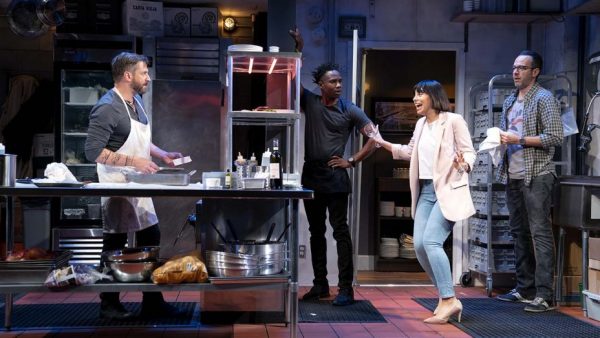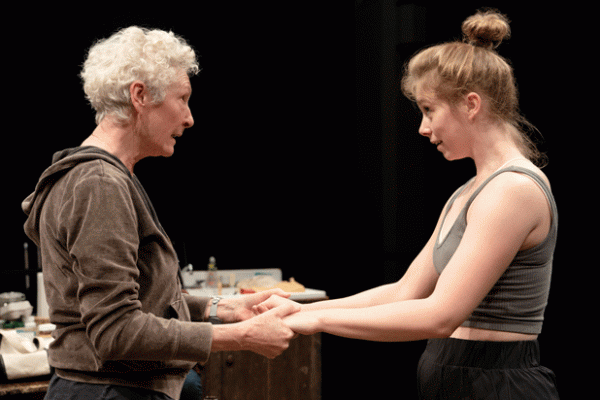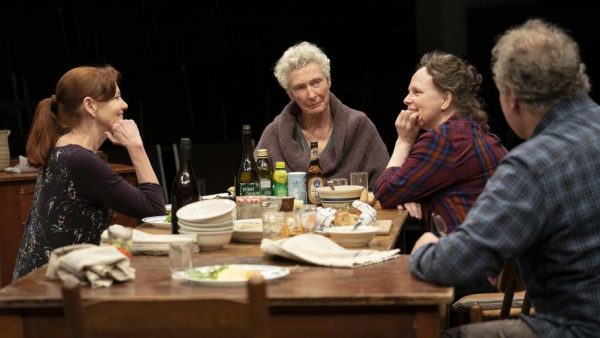“People suck. Only food is real,” rails Harry, the temperamental genius chef, in Theresa Rebeck’s riotous comedy Seared at MCC Theater. Harry is engaged in one of many contentious debates on the purity of his gastronomic art over commercial viability with the more practical Mike, his partner in a small restaurant in trendy Park Slope, Brooklyn. He’s stating his essential dilemma: life would be perfect if he didn’t have to deal with his fellow man and could just be left alone to cook. This is one of the better plays by the prolific Rebeck. The central conflict of a great but difficult artist against the realities of business is scarcely fresh, but her zesty dialogue and spot-on characterization gives a tasty tang to a familiar dish.

Credit: Joan Marcus
Brilliantly played by an intensely driven Raul Esparza in Moritz Von Stuelpnagel’s rapid-fire staging, Harry is a fascinating protagonist—charismatic, obnoxious, eloquent and infuriating. He finds fulfillment in preparing exquisite meals, but cannot deal with anyone interfering with his kitchen (designed with incredibly specific detail by Tim Mackabee), not even Mike who has invested all his money in their joint enterprise. Their place is tiny, seating only 12 with just one waiter, the even-tempered Rodney, one of the few people whose opinion Harry respects, because Rodney has no agenda for amassing money. When the struggling eatery receives a glowing mention in New York Magazine for Harry’s signature scallops, he refuses to cook them again. To save his investment which is about to go under, Mike brings in stylish consultant Amy to parlay the publicity into profits. Amy and Mike’s attempts to get Harry to compromise his purist vision and just cook the goddamned scallops form the arc of the plot, but it’s the edgy, quicksilver acting and Von Stuelpnagel’s precise staging that make Seared sizzle.

Credit: Joan Marcus
Esparza delivers the flashiest performance since Harry is the flashiest character. The versatile, Tony-nominated actor gets to have multiple hissy fits and, in one virtuoso silent scene, cooks an actual meal to perfection, giving each step of the recipe the right subtextual ingredients. David Mason beautifully bottles up Mike’s simmering rage and frustration, then lets it boil over to perfection. Krysta Rodriguez effectively glazes over Emily’s killer instinct with syrupy sweetness and W. Tre Davis whips up Rodney’s unexpected steely determination to save the restaurant when the service is about to become a disaster. This is a fantastic four-course meal.

Credit: Joan Marcus
The kitchen is also a source of drama in Richard Nelson’s The Michaels at the Public. Like his previous cycle of works which premiered at the same theater, four plays that make up The Apple Family Plays and the three that comprise The Gabriels, The Michaels takes place in a middle-class abode in Rhinebeck, New York where the residents argue, connect, and review their lives as they prepare and eat a meal together in more or less real time. A major difference here is the discussions are not as overtly political as in the previous works. Each of the Apple and Gabriel pieces took place on a significant day such as the 2012 presidential election, a primary, or a major televised debate. Now the only important news is the announcement of the killing of the leader of ISIS which receives a brief mention along with a short discussion on how our crude president is making America appear abroad.
The main action concerns Rose Michael, a semi-retired dancer and choreographer, and her battle with Stage 4 ovarian cancer. As Rose faces death, she stubbornly insists on continuing to make new dances while her daughter Lucy and niece May recreate two of her pieces for an upcoming retrospective of her work. Also in the kitchen, partaking of quiche and talk, are David, an arts manager and Rose’s ex-husband, Sally, David’s current spouse and a former member of Rose’s company, and Irenie, another ex-dancer from the troupe. The only non-arts person present is Kate, a retired history teacher and Rose’s caretaker who makes the dinner.

Credit: Joan Marcus
Nelson, who also directs with the same understated intimacy and simplicity he brought to the previous Rhinebeck plays, insightfully depicts the interrelations of this clan of artists and friends. The play is subtitled “Conversations During Difficult Times” and the reference is not just to the current tumultuous political scene. Each of the characters has reached a turning point and must make a hard choice. Lucy has a chance for a dance residency in Europe, but it would mean leaving her ailing mother. Kate has grown close to Rose, but her former lesbian partner wants her back. There are no easy answers or resolutions, just truthful exploration of differing emotions and perspectives.

The entire company is so naturalistic and the audience is so close to Jason Adrizzone-West’s homey set it feels as if we’re eavesdropping. Brenda Wehle is heartbreakingly vulnerable as the flinty Rose, alternately raw and robust as illness ravages her and she strives to overcome it. Jay O. Sanders (David) and Maryann Plunkett (Kate) have appeared in both the Apple and Gabriel plays and continue to create believable people coping with credible crises. There is similar clear-eyed, non-showy work from Rita Wolf’s Sally and Haviland Morris’ Irenie as well as from Charlotte Bydwell’s Lucy and Matilda Sakamoto’s May. The latter two also energetically perform the modern dance pieces their characters are rehearsing. It’s a bit of a stretch to believe they would be doing a full-out performance in a crowded kitchen, but that’s the only credulity-straining quibble in an otherwise flawless family portrait.
Seared: Oct. 28—Dec. 15. MCC Theater at the Robert W. Wilson MCC Theater Space, 511 W. 52nd St., NYC. Tue 7:30pm , Wed 2:30pm & 7:30pm, Thu—Fri 7:30pm, Sat 2:30pm & 7:30pm, Sun 2:30pm. Running time: two hours and 15 mins. including intermission. $66—$96. (646) 506-9393. www.mcctheater.org
The Michaels: Oct. 27—Dec. 1. Public Theater, 425 Lafayette St., NYC. Tue—Fri 7:30pm, Sat—Sun 1:30 & 7:30pm. Running time: two hours with no intermission. $60—$70. (212) 967-7555. www.publictheater.org.
This review previously appeared on Theaterlife.com.
